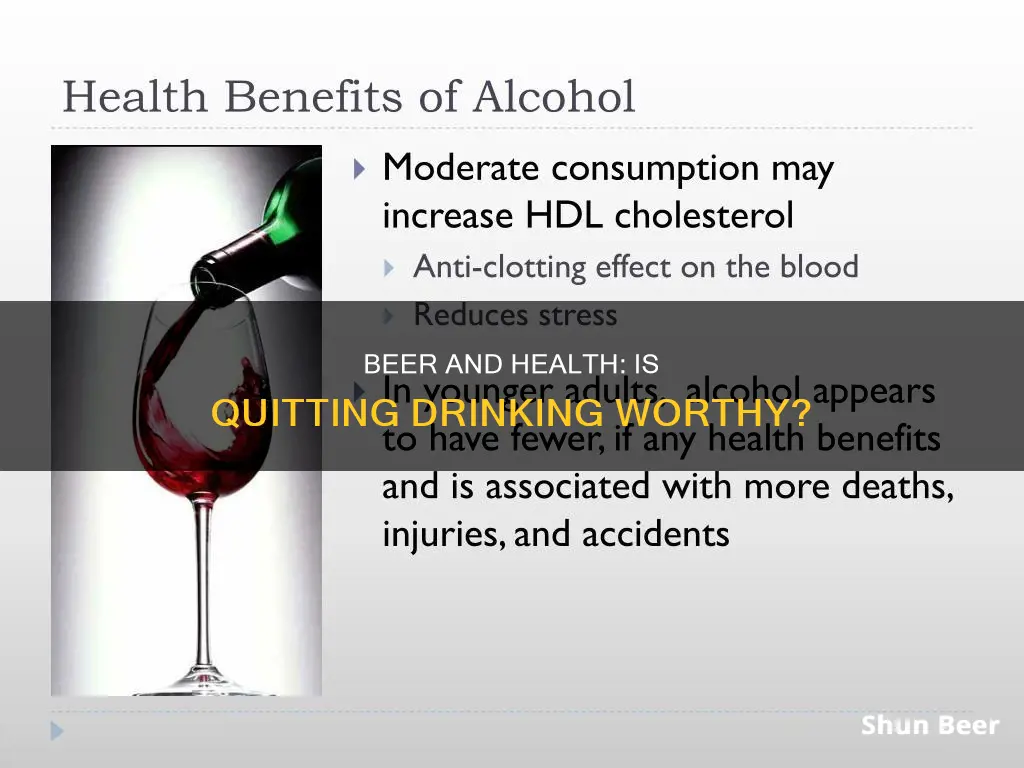
Beer is a popular alcoholic drink that has been enjoyed for thousands of years. While drinking beer in moderation may have some health benefits, such as improved heart health, blood sugar control, and stronger bones, excessive consumption can lead to various health issues. So, does health improve if you stop drinking beer?
Quitting or reducing beer consumption can have several positive effects on your health. Firstly, it can aid weight loss since beer is calorie-dense, and alcohol interferes with fat metabolism. Secondly, it can boost your immune system, making you less prone to common illnesses. Thirdly, it can improve liver health, as the liver bears the brunt of alcohol's damage and can regenerate when alcohol intake is reduced. Lowering beer intake can also help maintain healthy blood pressure and reduce the risk of heart disease and certain types of cancer. Finally, quitting beer can positively impact mental health by improving sleep quality, reducing anxiety and depression, and enhancing overall emotional well-being.
Therefore, while moderate beer consumption may offer some benefits, quitting or reducing intake can lead to a healthier lifestyle and lower the risk of various health issues.
| Characteristics | Values |
|---|---|
| Weight Loss | Alcohol is calorie-dense, and research suggests it is not as satiating as solid food. It may also inhibit the body from breaking down fat and may stimulate food intake. |
| Immune System | One night of heavy drinking can weaken your immune system for 24 hours, and chronic alcohol consumption increases the risk of contracting diseases like tuberculosis and pneumonia. |
| Liver Health | Research indicates that heavy drinking can lead to liver disease, including fatty liver, hepatitis, and cirrhosis. However, the liver has a remarkable ability to heal, and quitting alcohol can reverse some liver damage. |
| Heart Health | Alcohol can lead to high blood pressure and is a significant risk factor for heart disease. Eliminating alcohol allows you to maintain healthy blood pressure levels. |
| Cancer Risk | Alcohol is classified as a Group 1 carcinogen by the International Agency for Research on Cancer. It is linked to several types of cancer, including mouth, throat, voice box, esophagus, liver, colon and rectum, and breast cancer in females. |
| Sleep Quality | Alcohol disrupts the restorative REM stage of sleep and is linked to sleep disorders such as insomnia. |
| Mental Health | Alcohol is a central nervous system depressant and can worsen mental health conditions such as depression, anxiety, and panic disorder. |
What You'll Learn

You may lose weight
Alcoholic drinks are often calorie-dense, and the extra calories from drinking beer can add up quickly. Research suggests that alcohol is not as filling as solid food and may increase your appetite, making you more likely to overeat. Beer also interferes with the body's ability to break down fat, causing it to accumulate in the midsection and leading to the well-known "beer belly."
When you stop drinking beer, you eliminate these extra calories and the negative effects of alcohol on fat metabolism. This can lead to weight loss and a reduction in belly fat. However, it's important to note that the impact of alcohol on weight is complex and depends on various factors, including drinking frequency, age, gender, and genetics.
In addition to reducing calorie intake, quitting beer may also improve your dietary choices. Alcohol can lower your inhibitions and make you more impulsive, leading to poor food choices and increased consumption of unhealthy foods. By abstaining from beer, you may find it easier to make healthier food decisions and stick to a nutritious diet.
The weight loss benefits of quitting beer can have a positive impact on your overall health and well-being. Carrying excess weight, especially around the midsection, is associated with an increased risk of health conditions such as heart disease, type 2 diabetes, and certain types of cancer. Losing weight can help lower these risks and improve your long-term health outlook.
Beer and Metformin: Is It Safe to Drink?
You may want to see also

Your immune system will improve
Quitting or cutting back on beer can have a positive impact on your immune system. Alcohol can weaken your body's ability to fight off germs and illnesses. Even a single night of heavy drinking can lower your body's ability to ward off infections for up to 24 hours. Over time, excessive alcohol consumption can blunt your immune system, making you more susceptible to diseases like tuberculosis and pneumonia.
When you stop drinking beer, you give your immune system a boost. Your body can then more effectively fight off infections, making you less prone to common ailments like colds and flu. This heightened immunity can lead to fewer sick days, increased energy levels, and an overall improvement in your sense of well-being.
The impact of alcohol on the body varies depending on factors such as the amount consumed, frequency of consumption, and individual lifestyle and genetic factors. However, alcohol always has some effect on the body, especially with long-term and excessive use, which can lead to a range of negative health consequences.
By quitting or reducing your beer intake, you can improve your immune system's ability to protect your body and keep you healthy.
Buspar and Beer: Is It Safe to Mix?
You may want to see also

Your liver will be healthier
The liver is an incredibly important organ in the body, responsible for filtering toxins from the blood. Alcohol is toxic to body cells, and heavy drinking can take a toll on the liver, leading to serious conditions such as fatty liver disease and cirrhosis. However, the liver has an impressive ability to heal and regenerate, so reducing alcohol consumption or quitting drinking altogether can have a positive impact on liver health.
When you stop drinking beer, you're giving your liver a break from having to process and filter alcohol, which is a toxin. This means that the liver can focus on its other vital functions, such as bile production, protein synthesis, and the storage of important vitamins and minerals. It also has the opportunity to repair any damage caused by alcohol consumption.
Heavy drinking is defined as consuming 15 or more drinks per week for men and eight or more drinks per week for women. Drinking at this level can lead to a condition called fatty liver, where fat builds up in the liver and causes inflammation. This can progress to a more serious condition called cirrhosis, where the liver becomes scarred and unable to function properly.
By quitting drinking beer, you reduce the risk of developing these liver diseases. The liver is a resilient organ, and even after years of heavy drinking, it can regenerate and repair some of the damage caused. This means that it's never too late to improve your liver health by cutting down on alcohol consumption.
Not only does quitting beer improve your liver health, but it also has positive effects on your overall health. Alcohol consumption is linked to an increased risk of heart disease, high blood pressure, and stroke. By quitting drinking beer, you're also reducing these risks and improving your cardiovascular health.
In addition, alcohol is classified as a Group 1 carcinogen by the International Agency for Research on Cancer, the same category as asbestos and tobacco. Quitting drinking beer reduces your risk of developing alcohol-related cancers, including mouth, throat, liver, and breast cancer.
So, if you're looking to improve your health, quitting drinking beer is a great place to start. You'll be giving your liver a well-deserved break and improving your overall health and well-being. Remember, it's never too late to make positive changes for your health!
Beer Drinking: Healthy Habit or Harmful Vice?
You may want to see also

You will reduce your risk of heart disease
Drinking beer in moderation (one to two beers per day) may help lower your risk of heart disease. Research has shown that beer can be as effective at improving general heart health as wine, when consumed at comparable alcohol levels.
Beer's positive impact on heart health is not limited to reducing the risk of heart disease. Drinking one to four alcoholic drinks per day has been linked to a reduced risk of heart failure and fluid build-up in the body (congestive heart failure or CHF) in people aged 65 and older.
However, it is important to note that heavy alcohol consumption can increase your risk of heart disease and stroke. Therefore, moderation is key when it comes to drinking beer and improving heart health. Excessive alcohol consumption can also lead to high blood pressure, which is a significant risk factor for heart disease.
By quitting or reducing your beer consumption, you can help maintain healthy blood pressure levels and lower your risk of heart disease. This is because alcohol consumption above one to two drinks per day is associated with hypertension in both men and women.
In addition to the direct impact on heart health, quitting or reducing beer consumption can also have indirect benefits. For example, beer is calorie-dense, and research suggests that it inhibits the body from breaking down fat. By cutting back on beer, you may experience weight loss, which can also positively impact your heart health.
Beer and Buspirone: Is It Safe to Mix?
You may want to see also

Your mental health may improve
Drinking alcohol can have a detrimental effect on your mental health. Alcohol is a central nervous system depressant, and it can worsen mental health conditions such as depression, anxiety, and panic disorder. Research has shown that heavy and binge drinking is associated with a significantly higher risk of depression compared to moderate drinkers and non-drinkers.
However, by eliminating alcohol, you may experience reduced sadness and alcohol-induced anxiety, and your overall emotional well-being may improve. Alcohol can also cause psychological dependence, so if you're finding it hard to manage the emotional element of quitting, it's important to reach out for help. There are many resources available, including professional treatment centers, peer support groups, sober communities, podcasts, and social groups.
Alcohol also affects the hippocampus, which is the part of the brain associated with long-term memory, spatial memory, and learning. Excessive alcohol consumption causes this part of the brain to shrink. Cognitive functions—including problem-solving, decision-making, and self-regulation skills—can also improve with continued sobriety.
Alcohol has sedative properties, so while it may help you fall asleep faster, your sleep quality will suffer. Alcohol reduces the time spent in the restorative REM stage of sleep. Research indicates that alcohol disrupts circadian rhythms and is linked to sleep disorders such as insomnia. However, quitting alcohol might cause some sleep disturbances or insomnia initially, but sleep quality and quantity will improve with continued abstinence.
Drinking Dark Beer While Breastfeeding: What You Need to Know
You may want to see also
Frequently asked questions
Yes, health can improve if you stop drinking beer. Even moderate drinking can have health risks, so cutting back on alcohol consumption can have several physical and mental health benefits.
Some of the physical health benefits of quitting beer include:
- Weight loss: Alcoholic beverages are calorie-dense, and research suggests that alcohol interferes with fat metabolism, leading to weight gain.
- Improved immune system: Alcohol weakens the immune system, making individuals more susceptible to illnesses and infections.
- Better liver health: The liver can heal and regenerate, reversing some liver damage caused by alcohol.
- Lower blood pressure: Alcohol consumption is associated with high blood pressure and an increased risk of heart disease.
- Reduced cancer risk: Alcohol is a Group 1 carcinogen and is linked to an increased risk of several types of cancers.
Some of the mental health benefits of quitting beer include:
- Improved sleep quality: Alcohol disrupts the restorative REM stage of sleep and can worsen sleep disorders like insomnia.
- Reduced anxiety and depression: Alcohol is a central nervous system depressant and can worsen mental health conditions.
- Improved cognitive function: Alcohol impairs balance, speech, and judgment, and excessive consumption can cause the hippocampus, associated with memory and learning, to shrink.







